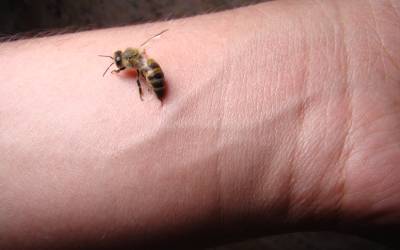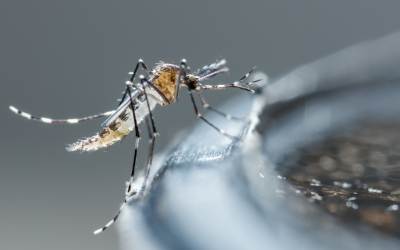Summer in Wisconsin is the best time to enjoy the sun, fresh air, and time with friends and family! Nothing can ruin your outdoor gathering quicker than a sting from a bee, wasp, or hornet. They will not only leave you with a painful sting but can also send those who are allergic to the hospital. Don’t let these stinging insects keep you from enjoying your yard this summer. Follow these few simple steps to keep your yard stinging insect free!
Identifying Common Stinging Insects
Wasps
The most common types of wasps you may find in your yard are yellowjackets, mud daubers and paper wasps. These types of wasps usually build their nests in protected areas such as under the eaves of homes. Mud daubers’ nests are unique clusters of 1-inch mud tubes whereas yellow jackets and paper wasps build nests out of a papery substance made from wood fiber.
Hornets
One type of hornet you may encounter is the bald-faced hornet. They are easily identified by their black and white bodies and are extremely aggressive, stinging anyone who comes near their nests. Another common hornet found in Wisconsin is the European hornet. They are large brown and orange-colored hornets, their nests are commonly found in hollow or protected areas.
Bees
Bees are known for their fuzzy bodies. The two most common types of bees are bumblebees and honey bees. Bees are extremely beneficial to our environment and play a crucial role in pollinating many flowers, fruits, and vegetables. If you find a beehive on your property, it is normally recommended you call a beekeeper or pest control company to relocate the hive instead of destroying it.
Rid Your Yard of Stinging Insects
After finding stinging insects around your home, many people’s first thought is “How do I get rid of them?” Here are a few easy ways to rid your yard of stinging insects.
- Remove abandoned nests in the winter: During the colder months, many stinging insects will leave their nests. This is the perfect time to remove nests to keep them from returning. If you find an active nest, removing them before they become more of a problem is best. For an active or abandoned nest, it is best to leave removal to professionals. Most stinging insects can sting multiple times and possibly send you to the emergency room.
- Hang traps: There are several types of stinging insect traps available at most big box stores. Some traps contain a sweet liquid to lure and trap the stinging insects while others emit a specialized frequency. Traps are not effective in eliminating nests, but they will keep the insects away from your patio – on the condition that you hang them away from areas of heavy foot traffic. Place them too close and you’re effectively bringing the wasps directly to you!
- Cover garbage cans: Wasps and hornets are known to fly around garbage cans looking for discarded meat or sweet, sugary substances. Make sure all garbage cans have lids that are securely closed to keep these scavengers away from your garbage cans and yard.
Calling the Professionals
The easiest and safest way to rid your yard of stinging insects is to enlist professional help. Trying to remove a nest by yourself can be dangerous and leave you with painful stings. Professional exterminators not only have the expertise to remove stinging insects but will also have the equipment to ensure it is done safely. At Batzner Pest Control, our skilled technicians will be able to quickly and effectively rid your yard of any stinging insects, keeping you and your family safe. Contact us today for a free quote!


